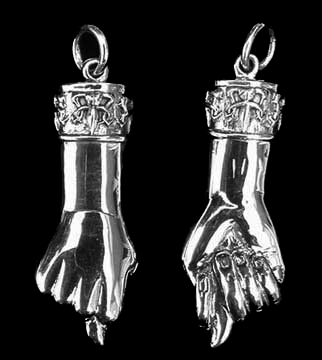My friends don’t believe me when I say my family believes in witches. They don’t believe that I had to carry around garlic in my pocket when I visited my dad’s childhood village, in case the jealous witches there tried to curse me. They don’t believe me, but it’s true.
When I would visit the rural parts of northern Portugal as a child, not many people escaped the poor farm life, and many less made it to America, a place of dreams and riches. Our allegedly rich life spurned a lot of jealousy, and there were a few people who my parents believed would seek vengeance. The garlic kept them away.
But not all Portuguese witchcraft and Pagan beliefs stem from jealousy or spite. Most are based on healing and protection. I grew up without thinking much about not taking food from strangers, or not crossing my silverware at the table. I didn’t even mind when my mother would air a cross with her fingers near my yawning lips. I never questioned any of it until I was older.
I started my first novel without any intention of writing about these experiences, and then, as most writers’ minds work, I found myself questioning every one of these memories. After some research, I couldn’t not write about it. I had to explore it, to question the origin of my own superstitions, which rarely connected with those of the American half of my culture.
Why did I always want a black cat, when they were considered bad luck in American culture? Possibly because in Portuguese culture, black cats are good luck. When your black cat dies, it is believed it’s in some way sparing you. Or at least that was what I was told as a child when a truck hit my first cat late at night. Blackie had a penchant for sleeping in the middle of road in the pitch dark of night, but that, of course, had nothing to do with it according to my parents.
When my family would go through months of medical procedures, only to never discover what was ailing them, they often turned to a witch doctor as a last resort. I, too, found a cure that way myself.
I was in grade school when I had visions of bees swarming me when I closed my eyes at night. It frightened me awake every time, and it’s the origin of my fear of bees. My mother, aware that I suffered from sleeplessness, took me to a witch doctor for a diagnosis. The woman suggested it was my deceased great-grandmother trying to communicate with me in the only way she knew how. My great-grandmother wanted to connect with me through these visions, not realizing she was scaring me in the process. I never experienced those visions again.
These Portuguese folk-religious practices, muddled with Roman Catholicism, are common in the rural villages of Portugal. Children and women are especially vulnerable to curses such as the “Evil Eye” and the “Curse of Envy.” Both of these curses can be fended off by wearing a symbol of the Figa, a fist with the thumb sticking out between the index and middle finger, which was first worn in Africa. I carried mine in the form of a charm on a gold necklace I wore daily throughout my teens.
Though they are prevalent in Portugal, these voodoo practices go as far back as the slave trade era of the 1500’s and originate in African culture, which the Portuguese adapted over their years of trading slaves on the African coast now known as Ghana. About four million of these slaves are estimated to have been brought to Brazil, a former colony of the Portuguese empire. This is not a part of my cultural history that I’m proud of, but I will not deny it.
Unlike other European slave trading countries, Portugal and Spain both embraced the Pagan beliefs of their African slaves, and so the rituals of witchcraft and voodoo seeped into their Christian customs. It is so prevalent in Brazilian culture, there are approximately two million followers of a faction of this blended religion, named Candomblé, in South America and Europe, and many dedicated temples scattered throughout these regions.
Centuries have passed, and though my youngest kin no longer practice many of these rituals, there are still a few I prefer to hold on to as tradition. Mainly, eating twelve raisins at the stroke of midnight on New Year’s Eve while making three wishes, even though I hate raisins. It was a tradition passed down by my grandmother, who died of Alzheimer’s many years ago. It’s my way of paying my respects to her every year while rekindling my Portuguese culture, as it seems to slip away every day I spend thousands of miles away from my family.
I don’t practice any organized religion, but I find myself still believing in all these Pagan superstitions ingrained in my psyche. This is why I remain Agnostic. I can’t say any of it exists, but then again, I can’t dismiss these unusual experiences. So until I find proof of one or the other, I’ll continue to keep my silverware separated and my raisins ready.
Written by : Suzanne Ferreira
Subscribe To My Newsletter
BE NOTIFIED ABOUT BOOK SIGNING TOUR DATES
Donec fringilla nunc eu turpis dignissim, at euismod sapien tincidunt.




